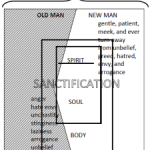HT: Rev. David Jay Webber

Another matter which has worried me for some time: In your absolutely correct and necessary insistence that Christ is the only Way to Salvation, do formulate more carefully especially as regards hell. It is surely not helpful to be insisting at every turn that such and such shall undoubtedly burn in eternal hell. As with unbaptised babies, so with those who never heard the Gospel, for instance, the Church has been much more reticent than that. We certainly don’t want to give the impression that we share the idea attributed to my hero, Thomas Aquinas, that knowledge of the tortures of the wicked will be part of the joys of Heaven! On the basis, particularly, of I Peter 3 & 4, I have for some years believed that God may yet have more and other ways of mercy in Christ than what He has told us about. Of course, I agree with the Preus statement that we cannot act on the basis of the assumption that there are other ways after death. We are bound to God’s revealed will, and must act accordingly. But He is not bound not to do more, or to be more merciful than He has promised! Of course it is clear that if one takes I Peter 3 & 4 in its most obvious, natural, historical-grammatical sense, as giving a case of salvation of such as died while still impenitent on earth, that too is not an instance of another way, outside of Christ: He is still the only Way, but He offered that Way to those beyond the grave.
To repeat, we cannot base our proclamation or ecclesiastical action on this sort of speculation, but are bound to God’s revealed will. But, as Dr. Koehne once pointed out to me: when Adam sinned, all he knew was ‘the day you eat thereof you shall surely die.’ He knew nothing, because God had not revealed it, about any future Savior or Salvation. Yet God had already provided this. Hence I like the explanation a Russian Orthodox lay-theologian once gave me of the formula ‘anathema maranatha’: it means that the Church’s judgments (anathema) stand until the Lord returns (maranatha). Then the Great Judge will make His own decisions.
In any case, I think John 21:21-22 has some relevancy: To Peter’s question “What about him?: the Lord replies “That’s my business—you just follow me.” I think the whole Bible is like that. It tells me my duty, responsibility, and opportunity—but I’m not to become too theoretically dogmatic about my neighbor’s fate. That’s up to God.
I like the explanation a Russian Orthodox lay-theologian once gave me of the formula ‘anathema maranatha’: it means that the Church’s judgments (anathema) stand until the Lord returns (maranatha). Then the Great Judge will make His own decisions.
I am by no means arguing against the seriousness of the Last Judgment, or the reality of hell – only I believe these things should not be stressed sort of in isolation (poor apologetics!), but must be seen in the total New Testament context. And this means to me at least that the dogmatic ‘defense perimeter’ around the central NT truth that Jesus is the Way, the Life, and the Truth, without Whom no one shall come to the Father, should not be overextended to such doubtfully defensible propositions as: ‘Whoever cannot affirm with dogmatic certainty that all those who have never heard about Christ will undoubtedly burn eternally in hell is not an orthodox theologian.’
I realize that this is a very inadequate treatment of a very serious issue, but I do not pretend to have exhausted it. These are only random thoughts as they have occurred to me over the years. If you can contribute to their further clarification, I’d be very thankful.
(Kurt E. Marquart, Letter to Herman Otten; quoted in Christian News, Vol. 49, No. 21 [June 6, 2011], p. 5. Emphases in original.)
+SDG+














